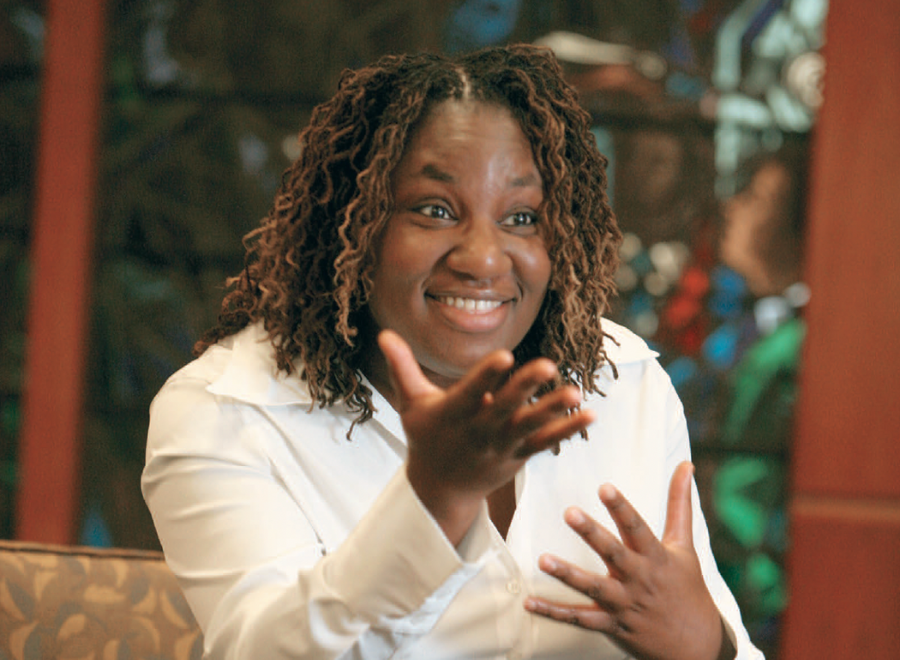The World Council of Churches is calling for reparations for the slave trade of the 16th to 19th centuries. Adele Halliday, a General Council staff member who attended a recent WCC conference on slavery, talks to Jocelyn Bell.
JOCELYN BELL: Why do churches need to make reparations for the slave trade?
ADELE HALLIDAY: The church was complicit in the slave trade. Some churches were literally built on the backs of slaves. And some said that segregation was okay. In many cases, church leaders were slave owners. In another sense, there was a kind of passiveness. So how is it that the church was silent while this heinous act was going on? The church should have been prophetic in saying, “This wrong, this is sin, and we as church believe that this is an affront to human dignity and we are going to stand against it.” And not enough of that happened.
Now is a time when we can be prophetic. We can say, we’re going to offer reparations and move toward healing, recognizing that many people now are still living the legacy of what happened all that time ago.
JB: Does making reparations mean financial payouts to the descendants of slaves?
AH: Reparations are about healing. They are a process of reconciliation that includes the restoration of relationships, confession-repentance, truth-telling and setting things right. So yes, reparations can include money, but they’re much bigger than that. We don’t want people to get stuck on money and saying people are after money. That’s not it at all. Reparations affirm the dignity and humanity of all people. They can encompass a financial figure or they cannot.
JB: Many Canadians believe that slavery only happened in the United States, that Canada was the end point of the Underground Railway and slaves escaped here to be free. Is that accurate?
AH: There often is a perception that Canada is better than the U.S. or that Canada did things very differently. Slavery was legal here for a long time, too. And yes it was abolished sooner, and yes there was a movement northward, but the conditions were still quite heinous for those who escaped. I think it was horribly bad in both places and manifested itself slightly differently.
And there was also a lot of resistance among people who were enslaved. That’s a story that’s not often told. There were people who were very actively resisting and putting their lives on the line to advocate for change.
JB: We don’t often feel very connected to that part of our history. Why is that?
AH: I think what happens is the descendants of that era say, “Well, that happened a very long time ago. That has nothing to do with me. I didn’t own slaves, my grandmother didn’t own slaves, why should I have to do anything differently?” I mean, there’s a huge disconnect and even though people say that you can’t blame the generations now for what happened generations ago, there is a strong connection between our present context and our historic legacies.
JB: What’s the legacy of the slave trade in Canada today?
AH: It’s all the things we carry that we often don’t even realize. Brokenness can be passed on from generation to generation. One image that comes to mind is the image of a scar. It appears to be healed over but there’s always a scar there, it’s never fully healed. I think the most apparent, obvious legacy is the ongoing legacy of racism, and all of the layers of that — systemic racism, systemic injustice, white privilege. There are still economic disparities that were there then and are here now.
One thing we often don’t talk about is the legacy of shame. The internalized racism, the internalized ideas around what it means to be Black or what it means to be a descendant of slaves. So many of us Black people walk around thinking there’s something wrong with us. Why are we feeling shame for something that was done to us? We were the ones who were heavily resisting. In one sense, that should be a source of pride. We shouldn’t feel shame. But that’s not happening.
So if there’s a process of reconciliation and healing and restoration of relationships, I think collectively, we can move to a better place.
JB: Should people who are the descendants of slave owners or descendants of the white people of that time feel shame?
AH: No, not necessarily. For me, guilt is not the place to go. It’s paralyzing and unhelpful.
JB: So what should the descendants of the white slave owners do?
AH: The question is, How do I use my piece of power to advocate for change? I do think it’s helpful for everyone to do analysis around how they hold power in different contexts. And recognizing, too, that we all hold multiple identities. Yes, I’m Black, I’m also a woman. In the global world, I hold a certain degree of economic power by being Canadian. One thing would be to explore the issues around, and the concept of, white privilege. Even the concept of whiteness and of “white” being a race. Often we name other things as races — Black or Asian, for example — but we don’t name whiteness. And we haven’t done enough exploration of what whiteness means in a Canadian context.
JB: Does Canada need an official apology, from the United Church moderator or the Prime Minister?
AH: Yes and no. Having a specific apology is not necessarily the end goal of the reparation. For me, it’s the process of reconciliation. My hope is that in some ways, we’re already on that journey. As we look back on 200 years of the formal abolition of the slave trade in the British Empire, the question is no longer about just Black-white. It’s no longer about former slaves and slave owners. It’s about one making links around how that intersects with other forms of oppression. Almost as if to say, the legacy that we continue to carry has given us broader insights into other forms of oppression — the residential schools, child labour, child trafficking. How then do we work with all the legacies we have and advocate for change?
JB: What would a Canada that had reconciled its legacy of slavery look like for you?
AH: It’s hard to say because we’re far from it. My roots are in St. Kitts. Sometimes, I forget that while at times I’m culturally Canadian, I’m very much culturally Caribbean. My cultural Caribbean-ness doesn’t always get to manifest itself in Canadian culture because I’m forced to be more Canadian. Often I feel like I’m giving up a part of myself or I’m not authentically being who I am. I think Canada would be a place where people would feel much more welcome and accepted. Where people could be culturally themselves and not feel like they’re hiding. If we authentically enabled all of that diversity to shape who we are, it would be completely different. Even down to what the official languages are.
JB: How is the United Church doing in terms of relations between Black and white people?
AH: One of the new associations that I work with is called the Journeys of Black Peoples in The United Church of Canada. It’s a grouping of self-identified Black people in the church. One of the things they struggle with is a feeling of isolation, feeling they don’t really belong in their congregation, in their Presbytery. Many of them talk about experiences of racism in their church communities.
JB: How have you experienced the legacy of the slave trade?
AH: One of the things we did on the first full day of the WCC conference is we had a Balm Yaad, a local tradition where people gather for healing. I remember thinking, as I walked into it, that I would be somewhat disconnected to it — because I’m fine. I’m strong and emotionally stable (laughs). Many people, including myself, were quite taken aback. We didn’t even realize that we needed healing until this took place. We didn’t even recognize the brokenness that we were carrying until we had the space to stop.
JB: What did you discover in yourself?
AH: Well, it wasn’t so much a huge emotional exploration, it was more just a different sense of calmness or tranquility. Something about it — it’s very intangible. I didn’t recognize until I was there that even though there’s strength, there’s also some woundedness.
***
This story first appeared in The United Church Observer’s March 2008 issue with the title “‘How is is the church was silent while the slave trade was going on?’”















